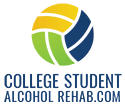Dangers of College Drinking
Alcohol is one of the most widely used psychoactive substances in the United States and a standard fixture at countless social functions, especially parties. Although alcohol is legal, it has the potential to cause both physical and psychological dependency. Ethanol, which is the active ingredient in alcohol that induces intoxication, is dangerous in more significant amounts. Unfortunately, the dangers of college drinking include the risk of developing an alcohol abuse disorder, as nearly 10% of college students engage in heavy alcohol abuse regularly. As a result, it is critical to search for college student alcohol rehab programs.
Since your liver is only able to filter one serving of alcohol every 1 to 1 1/2 hours, consuming large amounts of alcohol can lead to ethanol poisoning. While college is an opportunity to further your education, drinking is common among students, with more than 20% of college students struggling with an alcohol use disorder.
The Dangers of College Drinking
Young adults who attend college full-time drink more than peers in the same age group who don’t go to college. Alcohol is prevalent on college campuses, and binge drinking and alcohol abuse are common dangers of college drinking. Binge drinking occurs when a man consumes five or more or a woman consumes four or more servings of alcohol within 2 hours. Alcohol intoxication produces a euphoric and relaxing effect.
In large amounts, alcohol intoxication can cause:
- Lack of coordination
- Impaired judgment
- Lowered inhibitions
- Anger, depression, and irritability
- Memory loss
The dangers of college drinking include dependency, as abusing alcohol can cause a physical addiction that causes severe withdrawal symptoms if you suddenly stop drinking. Alcohol abuse causes you to drink compulsively despite dealing with negative consequences or having a strong desire to quit.
If you have an alcohol abuse disorder while in college, it can impact your grades, social life, and health. Since alcohol impairs judgment, it increases your chances of engaging in dangerous activities or experiencing conflict with others.
How Alcohol Abuse Disorders are Treated
Developing an alcohol abuse disorder requires treatment from an alcohol abuse treatment program. Alcoholism is a progressive disease that alters your brain chemistry and damages your mental and physical health. During addiction, your brain’s pleasure and reward center changes and ultimately only releases pleasurable neurotransmitters when you drink.
Eventually, your brain becomes unable to function appropriately or release neurotransmitters without alcohol, making it difficult to quit drinking without completing a substance abuse treatment program. Another reason treatment is necessary is because when you experience an alcohol use disorder, you’re more likely to become addicted to other substances.
College student alcohol rehab programs focus on providing you with the tools, skills, and support necessary to manage your sobriety. Since withdrawal symptoms can begin within hours of your last drink, connecting with a treatment program that offers medically supervised detox services before you start withdrawing is essential.
Alcohol withdrawal can cause delirium tremors, which is a rare but potentially fatal detox symptom that requires immediate medical treatment. Withdrawal symptoms typically alleviate within one week of your last drink, and treatment centers can reduce the severity of your symptoms, making your detox process more comfortable.
During alcoholism, your brain associates people, places, and things that remind you of alcohol with pleasure. This causes you to encounter powerful cravings when exposed to triggers. Treatment prepares you for cravings and triggers by teaching you healthy coping strategies, as cravings can occur long after your last drink.
Finding Help Today
Among the many dangers of college drinking is developing an alcohol use disorder. Alcohol abuse can negatively affect your personal, academic, and family life, making it essential to reach out for help when you’re struggling to control your drinking. If you would like to learn more about our alcohol abuse treatment programs, contact us today.

